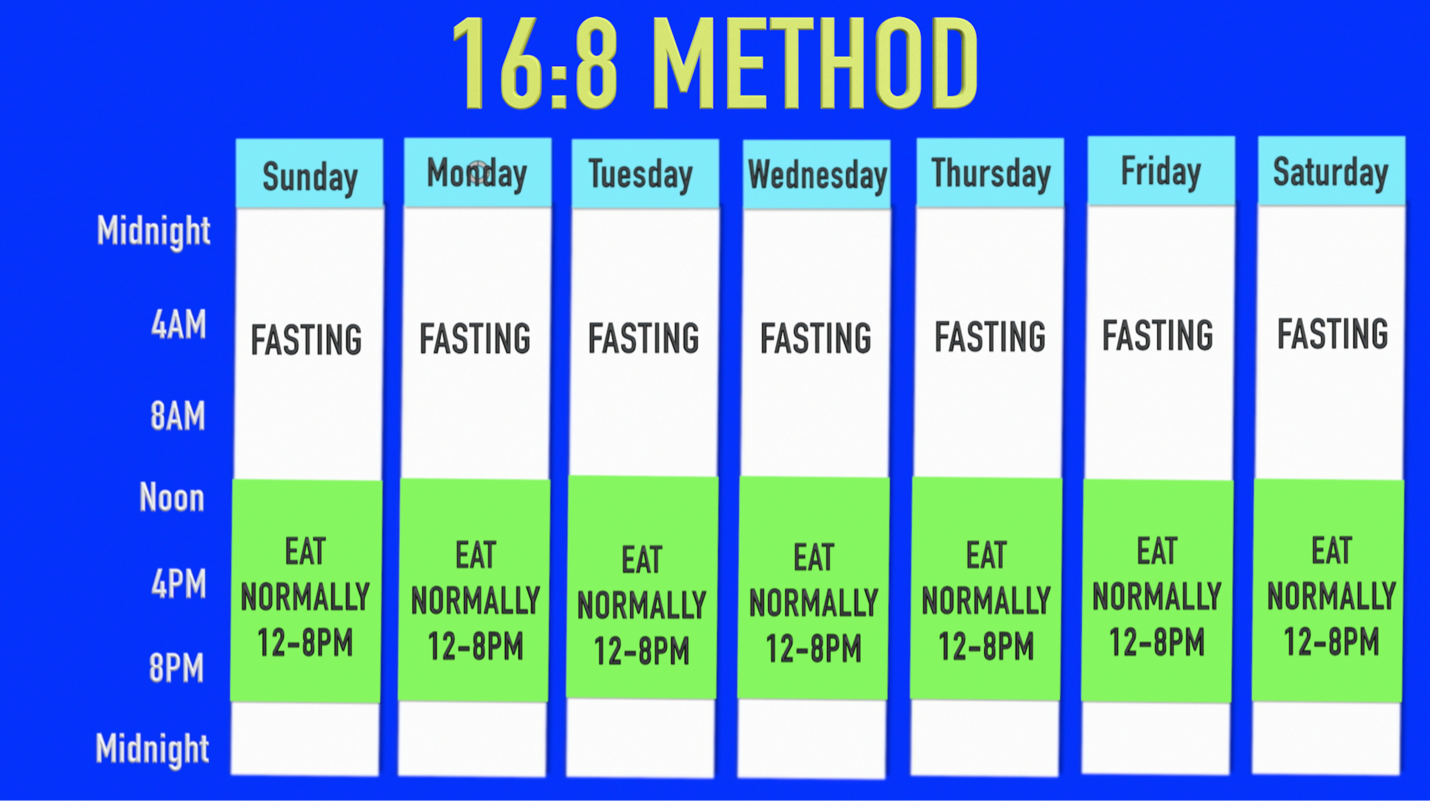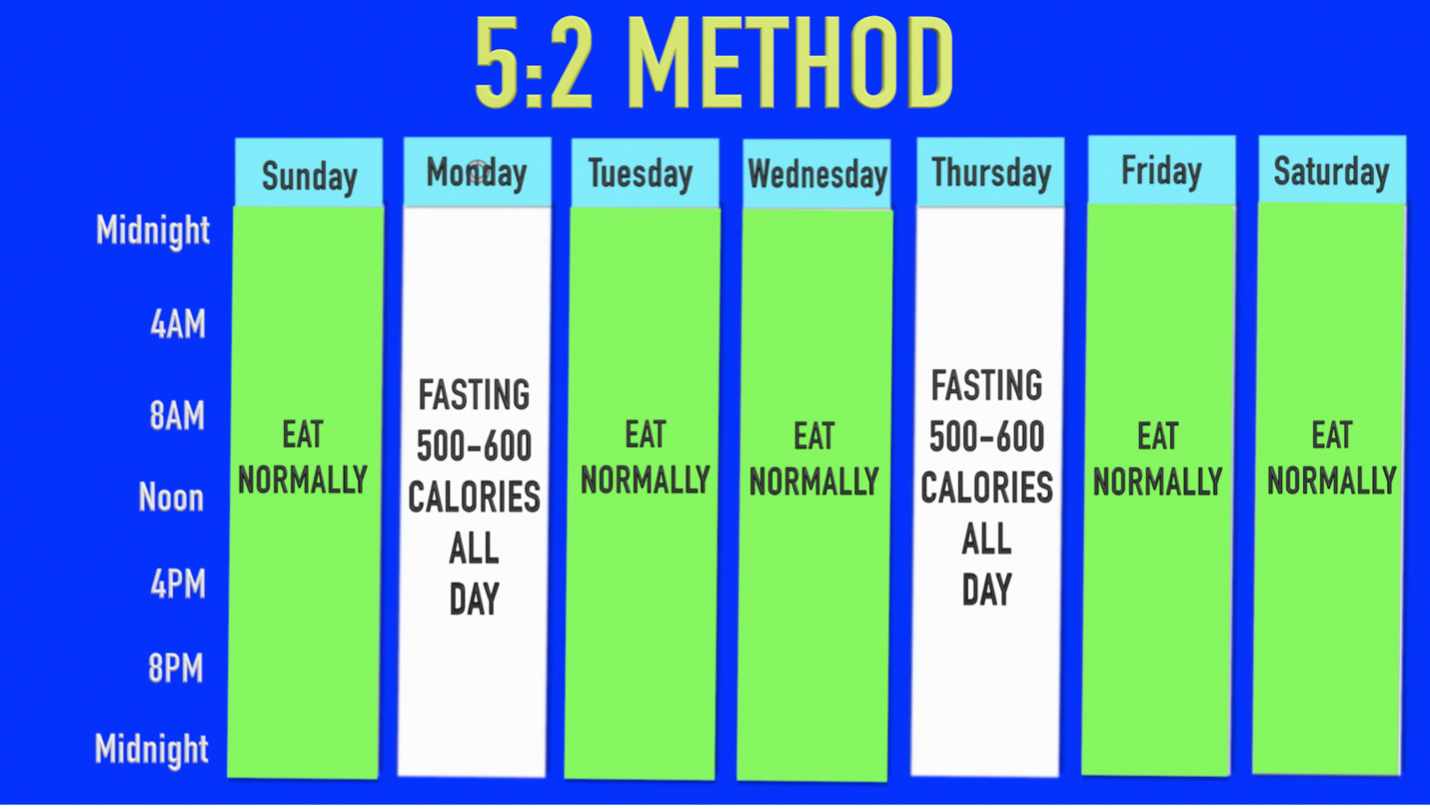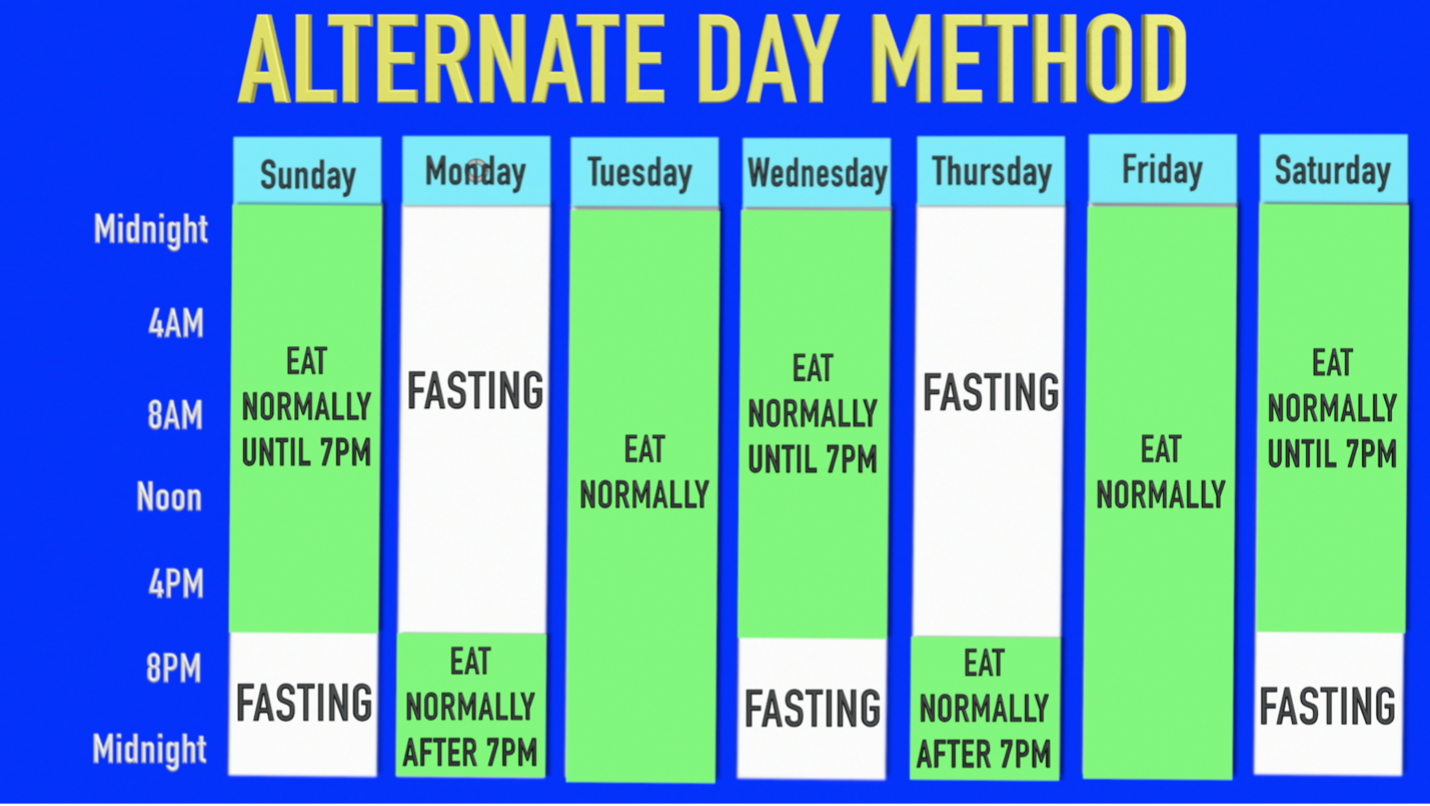Intermittent Fasting
April 2021

Within the past few years, a trend called Intermittent Fasting has come to the surface in the fitness and wellness realm that is actually showing some promising signs that it can help people lose weight, elevate the metabolic rate, maintain a healthier body and possibly even help people live longer. Although the science behind it is new and still being researched, there are some promising signs that it can lead to some pretty beneficial outcomes for people of all body types.
Intermittent Fasting is simply a plan that involves extended periods of time to go without eating, based on a pre-determined eating/fasting schedule. It is not considered a “diet” but rather an “eating pattern” since it does not involve restricting certain food groups or regimented calorie counting in most cases. The rationale behind it is that the human body is equipped to sustain itself without food for long periods of time and that it can actually help people lose weight by influencing both sides of the calorie intake spectrum: less calories in plus elevated caloric expenditure through elevated metabolic rate.
If you think about it, the human body has been conditioned to go without food for longer periods of time, since it was only until recently in human history that the availability of food was industrialized and abundant the way it is today. Hunter-gatherers would often go without food for long periods of time based on the availability of food in their regions, and three large meals a day would have been highly irregular. Additionally, versions of intermittent Fasting were (and still are) a common practice attached to popular religions, including Christianity, Islam, Judaism, and Buddhism. It is only recently that the effects of fasting on the systems of the body have been studied in detail, and the results are showing some promising signs for improved quality of life.
Still, there are some downsides to the process and some important warning flags exist regarding this practice, so I’m going to break it down here along with some of the popular methods that are being used today.
Benefits of Intermittent Fasting
Generally speaking, the main benefit to Intermittent Fasting has to be attributed to the metabolic rate and calorie intake. Obviously, going without food for an extended period of time will mean less calories taken in overall, but there’s more to it than just that. Fasting has been shown to elevate levels of norepinephrine/noradrenaline (a fat-burning hormone) in the body and can increase the metabolic rate anywhere from 3.6% to 14%. It also drops insulin levels in the bloodstream, which can make fat-burning much more accessible in the body. But the benefits don’t stop there. Certain smaller studies have shown other benefits, including:
Elevates levels of HGH: The Human Growth Hormone (HGH) is a hormone in the body that has been shown to slow the aging process in some ways. HGH is also attributed to muscle gain and better cellular health. During intermittent fasting, the levels of HGH tend to skyrocket to as much as 5x the normal level. There have been a few myths floating around about how fasting can lead to loss of muscle, but no proof has been shown that this is true, and the elevated levels of HGH are a sign that the opposite may be more likely.
Cellular Repair: During fasting periods, cells build up what is called autophagy. This helps cells digest and remove old dysfunctional proteins that linger in the cellular structure, allowing the cells to repair themselves faster.
Lowered Risk of Insulin Resistance (or pre-diabetes): By reducing insulin levels in the body up to 3-6% regularly, the body becomes more equipped to control the level of insulin in the body which can prevent insulin resistance from becoming a problem in some people.
Heart Health/Cancer Prevention: Intermittent Fasting has shown that it can lower levels of triglycerides and “bad” LDL cholesterol in the bloodstream. There is also a connection with lowered levels of inflammation in the body, which is known to trigger certain types of cancer.
Gene Expression: Fasting, along with the body’s responses to it can clear the way for genetic processes to operate, which can be related to longevity and resistance against diseases.
Brain Health and Prevention of Dementia: A few smaller studies have shown that Intermittent Fasting increases the levels of the nerve hormone BDNF, which can lead to the production of new nerve cells in the brain. The theory is that the increase in BDNF can build up and repair damage in the nervous system and brain which can help prevent dementia and possibly Alzheimer’s disease. But trial studies are still very new and few at this point, so although this is a promising sign, the jury is still out on this one.
A Couple of Downsides
Although there are some promising signs attributed to Intermittent Fasting, there are a couple of known downsides as well as a couple of warning signs that still need to be researched. Anyone thinking about trying it out for themselves should know about these as things and look out for them as they go through the process.
People with eating disorders: Intermittent Fasting is not recommended for anyone that has gone through certain eating disorders. Along with the irregularity of eating, which is already a struggle for some, it can possibly trigger old habits for some that have worked through such disorders and possibly even reintroduce some body issues that were once causing problems during the period of the disorder.
May have different outcomes between Men and Women: Current and preliminary statistics show that the benefits of intermittent fasting are slightly more prominent in men than women. It can lower the risk of insulin resistance and pre-diabetes in most people, but in some cases, a few women found that it made it harder to control blood sugar levels overall. There have also been a few reports of women that had their menstrual cycle stop while practicing intermittent fasting, which could be problematic. If this is something that happens to you, it is recommended that you stop fasting and talk to a doctor.
Binge eating during eating periods: It is common for people to sometimes overdo it during the eating periods of intermittent fasting. When you are hungry at the end of a fasting period, it is common to make really bad decisions about what types of foods you run to when it’s time to eat. Eating too much or making bad food choices can certainly offset any progress made from fasting periods. It’s best to have a healthy plan already made for eating periods before starting an intermittent fasting schedule.
High-intensity workouts during fasting periods may come with a risk of injury: As the blood sugar levels drop in the body, people tend to feel more lethargic. Any high-intensity workout does require attention to body alignment and form. If you are feeling tired during a workout of any kind, proper alignment and technique can slip, making anyone prone to injury if you are not careful. Some athletes have suggested taking a BCAA supplement prior to workouts if they are in a fasting pattern. This amino acid supplement is thought to help muscular efficiency and might help you feel more energized in your workouts.
Different Intermittent Fasting Schedules
There are many different methods or schedules for intermittent fasting. There are some companies out there right now claiming that certain eating schedules for fasting have can greater effects on certain types of bodies.
For example, “follow this schedule for eating if you have a lot of belly fat” or “try this schedule to burn off lower body weight”. But at this point, there is no science to support these theories. Oftentimes, these “fasting plans” that give you individualized fasting schedules according to body type are working primarily off of assumptions at this point. In order to properly study effects like this, it takes years. So don’t plan on them having any real solid evidence on the effects of these theories for a while. At this point, it’s best to choose a fasting schedule that works with your lifestyle, work schedule, energy levels, activity levels, and other lifestyle habits. Start small and pay attention to your body as you begin. Here are a few of the most common plans:
The 16-8 method or the “Leangains Protocol”:
Sixteen hours no eating, eight hours eat as much as needed for seven days a week. This one is the one that I practiced for a while to see how it went. A good way to do this one is to eat dinner early the night before, then skip breakfast and have a late lunch. I should note that I didn’t do the fast for seven days a week. I recommend starting off with three days a week to get used to it, and then add more days as time goes on. The first week was tough, and I felt really lazy during the morning and daytime. But by the second week, I got used to it, and it felt fine.

“5-2 Diet” or “Eat-Stop-Eat”:
Eat reasonably for 5 days a week and then limit your calorie intake to only 500-600 calories all day for two days a week. This one can be tough, and you really should plan to do the fasting on days when your overall activity is a little lower.
People I know that try this one usually recommend skipping breakfast and having a small snack around 2 pm. Then have another small snack prior to bed so you can sleep without waking up in discomfort.

“ALTERNATE DAY” Method”:
Limit your calorie intake to only 500-600 calories for 24 hours every other day. This one involves 24-hour periods of not eating, just like the “5:2 method”, but it does involve more fasting because there are technically more than two days of fasting each week. The good thing about this one is that you can be strategic about when you begin your fast.
You can either simply limit your calories to 500-600 calories for three days a week (every other day), or like the illustration shows, you can begin your 24-hour fast mid-day and end with a late dinner at the end of the 24 hours every other day. Basically, no food from dinner to dinner.

Tips to make it work:
During fasting periods, drink lots of water, tea (or coffee if you prefer). It helps you feel less hungry. But have a bathroom handy at all times because it’ll go right through ya!
Don’t make the mistake of doing any grocery shopping during a fasting period. I can’t tell you how hard it is to make wise decisions about what you buy when you are fasting. You’ll likely end up eating horribly during the eating periods and eliminate any benefit from the fasting periods.
Try to avoid high-intensity workouts during a fast. Doing a medium-intensity workout is usually ok during a fast, but activities that require attention to detail can be tough, and performing complex exercises with an empty tank of gas could lead to some compromised form sometimes.
Just be careful.
Address
San Francisco, Bay Area
Tel: (925) 954-8499